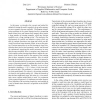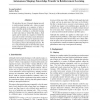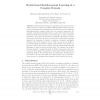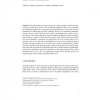1047 search results - page 12 / 210 » Learning the required number of agents for complex tasks |
CRV
2009
IEEE
14 years 2 months ago
2009
IEEE
In this paper we introduce the concept and method for adaptively tuning the model complexity in an online manner as more examples become available. Challenging classification pro...
ICML
2006
IEEE
14 years 8 months ago
2006
IEEE
We introduce the use of learned shaping rewards in reinforcement learning tasks, where an agent uses prior experience on a sequence of tasks to learn a portable predictor that est...
ROBOCUP
2007
Springer
14 years 1 months ago
2007
Springer
Reinforcement learning is a paradigm under which an agent seeks to improve its policy by making learning updates based on the experiences it gathers through interaction with the en...
PAAMS
2010
Springer
13 years 6 months ago
2010
Springer
The huge number of cores existing in current Graphics Processor Units (GPUs) provides these devices with computing capabilities that can be exploited by distributed applications. I...
ICPR
2000
IEEE
14 years 1 days ago
2000
IEEE
Many realistic visual recognition tasks are “open” in the sense that the number and nature of the categories to be learned are not initially known, and there is no closed set ...




